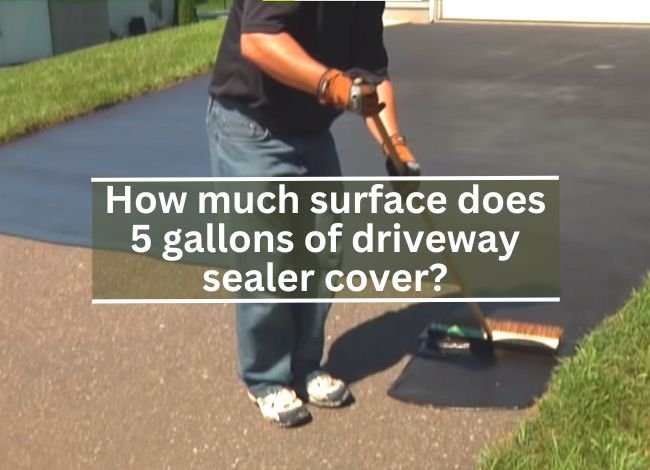Last Updated on May 12, 2025
A driveway is a private road constructed by a homeowner to connect the public road to their garage, typically used for parking vehicles. When planning to seal a driveway, it’s essential to estimate the amount of driveway sealer needed to ensure complete coverage. In this guide, we’ll explore how much area a 5-gallon driveway sealer can cover and the estimated cost of sealing a driveway, including key factors that affect the price.
How Much Area Does a 5-Gallon Driveway Sealer Cover?
The coverage of a driveway sealer depends on the number of coats, the surface texture, and the product’s formulation. On average:
- 1 gallon of sealer covers approximately 40 square feet for the first coat and 60 square feet for the second coat, totaling around 50 square feet for two coats.
- Therefore, to seal 100 square feet, you would need about 2 gallons of sealer.
Based on this estimate:
- A 5-gallon driveway sealer can cover approximately 250 square feet when applied in two coats.
- If you’re applying a single thin coat, it can cover up to 400 square feet, depending on the sealer type and surface condition.
This makes a 5-gallon sealer ideal for medium to large driveways, especially if you have SUVs, trucks, or multiple cars.
Related: Can driveway sealer be applied to a wet surface?
How Much Does a 5-Gallon Driveway Sealer Cost?
The price of a 5-gallon driveway sealer can vary depending on its quality, brand, and type (asphalt-based, acrylic, coal tar, etc.):
- High-quality sealers with longer durability and weather resistance can cost up to $200.
- Economical or basic-quality sealers are typically priced between $40 and $60.
With proper application, a 5-gallon container is often sufficient to seal a 250–400 square foot driveway, offering good value for money and long-term surface protection.
Factors Determining the Cost to Seal a Driveway
Not all driveways are created equal, and the cost to seal them can vary significantly based on several factors. Some homeowners may be able to seal their driveways at a lower cost, depending on specific conditions and choices. Here are the key elements that influence driveway sealing costs:
1. Type of Sealant
The type of driveway sealer you choose plays a major role in overall cost. Basic sealants can cost as little as $0.06 per square foot, while more eco-friendly or premium-grade sealants may cost up to $0.38 per square foot. Naturally, the higher the quality and environmental rating, the more you should expect to spend.
To estimate your total cost, simply multiply the square footage of your driveway by the chosen sealant rate.
2. Number of Coats
Typically, driveways require one or two coats of sealant. If your driveway is exposed to heavy-duty use—such as large trucks or frequent traffic—then applying two coats is recommended for added protection. Keep in mind, this will increase your total cost due to the additional material and labor.
3. Driveway Size
Size is a straightforward cost factor. Contractors usually price sealing projects per square foot, and average costs range from $1.25 to $1.50 per sq ft. Smaller driveways will obviously be cheaper to seal, while longer or wider driveways, especially those meant to accommodate larger vehicles, will require more material and labor, driving up the expense.
4. Driveway Shape
The shape of your driveway also affects sealing costs. Straight, flat, and uniformly shaped driveways are more cost-efficient because they require less effort and sealer. Since all sections are of even length and width, contractors can work quickly and use materials efficiently.
However, irregularly shaped driveways—such as curved paths or narrow entrances designed for larger vehicles—can be more difficult and time-consuming to seal. These unique shapes require more sealer in certain areas, leading to increased labor and material costs.
Final Thoughts
When sealing your driveway, knowing how much area a 5-gallon driveway sealer can cover helps in budgeting and avoiding product shortages. Whether you’re planning a DIY driveway sealing project or hiring a contractor, understanding coverage and cost is key to getting the best results and maintaining your driveway’s longevity.
